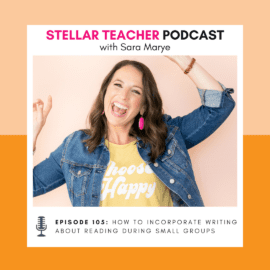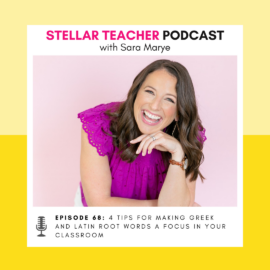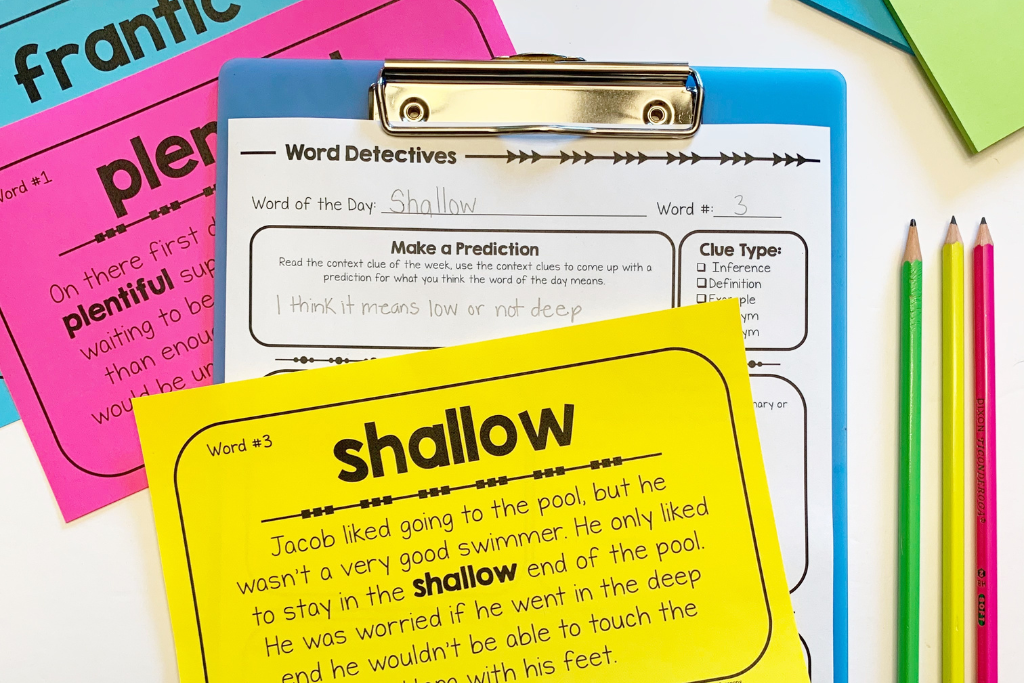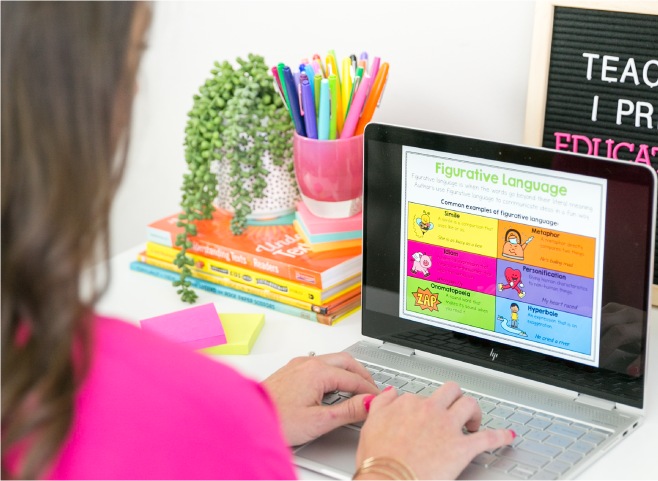
Click play below to listen to ways you can make test prep season more manageable for you and your students.
Standardized testing season is just around the corner, and if the thought of long testing days, endless review packets, and restless students already has you stressed, you’re not alone. In this episode of our Dear Stellar Teacher series, Sara and Emily are sharing realistic and encouraging strategies to help you navigate test prep season with more joy, confidence, and intention—without overwhelming your students (or yourself!).
From building test-taking stamina to rethinking how we review and prep, this conversation is packed with actionable ideas to help you maintain a positive classroom environment and keep students motivated and supported during testing season. Plus, you’ll hear some of our favorite ways to create balance and avoid burnout, so your students can show up on test day feeling confident and calm.
We also share a few common mistakes to avoid during the final weeks of test prep, along with our go-to ways to maintain your normal literacy routines while still meeting test prep goals. Whether you’re a test-season veteran or heading into your first round of state assessments, this episode will help you finish the year strong—with a little more fun and a lot less stress.
Do you have a burning question you want us to explore on the podcast? Or maybe you have an amazing story that deserves a shout-out? We’d be thrilled to feature your question or stellar story on the show! Simply fill out this form. We can’t wait to hear from you!
In this episode on thriving during test prep season, we share:
- Why building test-taking stamina is essential—and how to do it in small, manageable steps
- A fresh approach to test prep by treating standardized tests as their own “genre”
- Simple ways to make review more engaging through movement, collaboration, and classroom rotations
- How to incorporate incentives and class-wide goals without creating pressure
- The importance of balancing test prep with meaningful literacy routines and joyful activities
- Strategies for continuing to build background knowledge and vocabulary during test prep season
- What to avoid during the final week before testing to help students feel confident and calm
Resources:
- Join The Stellar Literacy Collective and get access to our Test Prep Resources
- Fill out the Dear Stellar Teacher form for a chance to be featured on a future episode.
- Sign up for my Private Podcast: Confident Writer Systems Series
- Sign up for my FREE Revision Made Easy email series
- If you’re enjoying this podcast, please leave a review on Apple Podcasts!
Related Episodes:
- Episode 238, Dear Stellar Teacher: How Can I Reach My Goals Without Feeling Overwhelmed?
- Episode 234, Dear Stellar Teacher: What’s the best way to teach comprehension strategies and skills?
- Episode 185, It’s Test Prep Season: Here Are 4 Ways to Make It More FUN!
- Episode 126, From Stress to Success: Strategies for Empowering Students on Testing Day
Connect with me:
- Email us questions or share a teaching story: [email protected]
- Join my newsletter
- Shop my TPT store here
- Subscribe to our YouTube channel
- Instagram: @thestellarteachercompany
- Facebook: The Stellar Teacher Company
More About Stellar Teacher Podcast:
Welcome to the Stellar Teacher Podcast! We believe teaching literacy is a skill. It takes a lot of time, practice, and effort to be good at it. This podcast will show you how to level up your literacy instruction and make a massive impact on your students, all while having a little fun!
Your host, Sara Marye, is a literacy specialist passionate about helping elementary teachers around the world pass on their love of reading to their students. She has over a decade of experience working as a classroom teacher and school administrator. Sara has made it her mission to create high-quality, no-fluff resources and lesson ideas that are both meaningful and engaging for young readers.
Each week, Sara and her guests will share their knowledge, tips, and tricks so that you can feel confident in your ability to transform your students into life-long readers.
Tune in on your favorite podcast platform: Apple, Google, Amazon, Spotify, Castbox, and more! If you’re loving this podcast, please rate, review, and follow!
Podcast (stellar-teacher-podcast): Play in new window | Download
Sara
Hey there, stellar teachers, welcome back to another episode of our monthly segment, Dear Stellar Teacher. We air this segment on the first Monday of every month, and I love these episodes because I get to be joined by my teammate Emily, where we get to have a more casual conversation about teaching and things that are going on in education.
So Emily, welcome back to Dear Stellar Teacher. Of course, I love when you get to join us.
Emily
Hey, Sara, so happy to be here. And I just have extra pep in my step today because I’m in that spring joie de vivre. And if you hear any lawn people, I’m not the only one who’s prepping for spring, apparently.
Sara
Well, and as we are approaching spring… I know this is everybody’s favorite time of the year—not only from a weather standpoint—but also, we are approaching test season.
Okay, I know that for the most part, teachers typically dread test season. I know I didn’t particularly love it, so we wanted to do an episode where we could share some of our favorite ideas and strategies for how to make test season more manageable. And I know when I was in the classroom, I sort of had this—I don’t want to say a personal renaissance, because I feel like that sounds extreme—but I really shifted my mindset around, like, okay, this is something my students have to go through, I have to go through. So rather than making it stressful and really high pressure, what are things that I can do to make it more enjoyable for my students? And so I know you’ve got some similar strategies as well. So we’re going to share some things that hopefully will make you maybe a little bit more excited about test season. But before we jump into that, let’s chat about books. Emily, what are you currently reading? And is there anything that you can recommend?
Emily
Okay, so I am currently reading a book that people love called The Measure.
Sara
Oh, okay. I had that on my Libby account, and I didn’t read it. It went back to Libby. So do I need to reclaim it?
Emily
Well, I hate to slander, but I am just having a hard time getting through it. I mean, everybody has those books, right?
Sara
Yeah, uh-huh.
Emily
I think it’s just because I’m not prioritizing my reading time. And then I go to lay down at night and just fall asleep after one page. But my husband read it, and my friends read it. Everybody loved it, so everybody’s recommending it. So I do want to finish. I don’t want to give up. I have, like, an hour left per my little Kindle—you know that little timer at the bottom? So I am going to finish it. It did get better, I will say.
And then I’m excited because my book club has chosen The Last Letter by Rebecca Yarros. And those of you who have listened know that we are big Rebecca Yarros fans, especially her Fourth Wing series—wait, what’s the first one called? I can’t even remember. Fourth Wing, Iron Flame, and Onyx Storm. So we love that here on our team. But The Last Letter is about somebody who’s married to a person who gets deployed for the military. And I’m kind of dragging my feet starting it because I’m six months pregnant. I don’t know if I’ve said that on the podcast yet.
Sara
Yay! We have a little Stellar Teacher baby!
Emily
Yeah, we’re going to name her Stella—just kidding.
Sara
I hope so. That’s my vote.
Emily
But I’m just overly emotional, so I’m kind of dragging my feet starting this one because I just know I’m probably going to cry the whole time.
Sara
I have heard from friends that it’s really good, but that it’s like, if you need a good cry, read this book.
Emily
Oh my goodness.
Sara
I don’t really need a good cry, because I just cry normally. But you’ll have to let me know how it is.
Emily
I sure will. What about you? What are you reading?
Sara
I feel like I’ve been in a bit of a book slump. I read three mediocre romance books—like, they were just like, eh, they were okay. And so I just downloaded from Libby, or I just got it on my Libby account, The Seven Year Slip by Ashley Poston, I think. And I’ve heard good things about it, so I’m excited to read it. But I know right before we started recording, you mentioned that that was a did-not-finish for you.
Emily
Yes, that was a DNF for me.
Sara
So we’ll see. I’m just five pages into it.
Emily
My book club really liked it.
Sara
Okay, fingers crossed. Because I just kind of feel like I need a book that I can get really excited about. Because yeah, I’ve just been… I don’t know if I’m more picky. It’s like, the more I read, the more critical I am of books. But yeah, I just haven’t loved anything I’ve been reading lately.
Emily
That’s an interesting reflection.
Sara
I don’t know. We’ll see. So anyway, well, I’d love to chat about books the whole time, but let’s talk about test-taking season. I know that’s something that teachers are quickly approaching. When you were in the classroom, what was your go-to, or what was that one thing you did during test season to try to make it easier for you and your students?
Emily
Yeah, okay, so kind of preparing for this podcast, I wrote down two big tips, and my first big tip is to build test-taking stamina. Now, before I dive into those details, let me just say, when I sat down to prep for this podcast, I was like, ugh. So I just want to acknowledge the space that we’re in, and that we know that testing is not fun. Yeah, we know that it’s not fun. So I just want to say my heart goes out to teachers who are entering test prep season, and I hope that you can still find the joy, because we are kind of moving toward the end of the school year, and these are the last couple of weeks that you’re going to have with your students. So I hope that you can still find joy, even though we’re getting ready for those tests.
Okay, so my team and I, one of the things that we really noticed with our students was just, you know, overall classroom culture. We were teaching in small groups. We’re moving. We were adding movement into our instruction to make it engaging, and that made it really difficult for our students to sit through an entire test. I taught in North Carolina, and our tests would take three to three and a half hours, and we’re asking these eight-year-olds or nine-year-olds to sit there for that long. So right around this time of year, we started doing something just called “building stamina,” and it was literally like sitting still.
And is it fun? No. Yeah. But ultimately, we are doing our students a disservice if we’re not preparing them for things like this. So we would have them do things like read passages, and then we would have them transition to independent reading. And of course, I would still be there, you know, moving around and talking to them, but really just trying to build up that test-taking stamina, incorporating longer amounts of time that they were focusing.
Sara
Yeah, and I think, as an adult, I have a hard time sitting for that long. And if we even just think about our attention spans—like, we have such a short attention span these days—and it’s like we’re asking students to stay focused on one thing without any social interaction, engagement, or feedback. That is really challenging. And so I love this idea of slowly building up that stamina, because you’re right, it is one of those things—to your point at the very beginning—we don’t like testing season, right? It’s like, we don’t think that this is what’s best for students. If we could wave our magic teacher wand or whatever, we’d get rid of it. But since it exists, it’s part of our system, we have to do what’s best for our students and help them be as prepared for it as we can. So yeah, this idea that we need to slowly build their stamina so that on test day, they’re not going crazy because they have to sit for so long.
Emily
Yeah, and I mean, I do feel for them. I really, really do. But yeah, incorporating this kind of idea and getting them used to it will really help them during that test.
Sara
I love that. So one of the things that I did that always had really good success with my students is, first of all, one of the things that I loved doing when I was teaching was really focusing a lot on genre. It was, I don’t know, one of my favorite topics to talk about with my students. I’ve talked about it a ton on this podcast. We did genre studies, and we were always just talking about the genre of texts. So when I got to test prep season, we treated the standardized test as if it was a genre. And so this made it much more of an inquiry-based approach. I think my students also recognized that when they were getting ready for this test, they had to treat it differently than a normal reading experience.
So we started off by introducing the idea: “What is the genre we’re studying?” Standardized tests. We would take a look at some practice tests, and students would pay attention to the attributes—so noticing the passages, noticing the questions, noticing the directions, paying attention to all the details that make up this genre. But then we also talked a lot about the purpose. What’s the author’s purpose for creating this genre, right? So for assessment—to recognize that that’s the purpose. That allowed us to even talk about the purpose of the questions and the answer choices. So we could talk about how some answer choices are there as distractors, right? And how the authors are sometimes—I don’t want to say they’re trying to trick students—but I think sometimes they’re making it intentionally difficult.
But we also talked about how, because this is a standardized test and you can only communicate what you know through multiple choice, you have to think about it differently. We’re not going to be writing summaries, we’re not going to be asking and answering open-ended questions, we’re not having the same discussion about it. We need to approach it in a completely different way. But having this conversation about treating a standardized test as a genre, I think, took some of the pressure off of students. It made it seem like, “It’s okay. This is just another genre that I can study. I can pay attention to it.” It almost made them feel a little bit more empowered because they were able to think about the test from the test writer’s perspective, as opposed to just as a student.
Emily
Yeah, we did stuff like that too. We’d be like, “Oh, those evil test makers are trying to trick you. That’s a trap.” But I really love that approach because it’s so important that we expose students to those types of things. It’s also so important that we expose them to the academic language that’s going to be on the test too. And I know that sounds like it was a huge part of what you did with that.
Sara
Right? Like this idea that when we’re having an authentic reading experience, the way you summarize is going to be different than how you summarize on a standardized test. Your inferential thinking that happens when you’re reading a chapter book is different than how you need to think about inferential thinking on a standardized test, simply because you’re limited to multiple choice questions and answers. That’s very different than in the real world, where it’s a lot more open-ended and a lot more up for the interpretation of the reader. So I think just recognizing that even the application of reading skills is different on a standardized test than in a normal reading experience—and students need to be aware of that.
Emily
100%. And I know that you taught in Florida and Texas… where else?
Sara
Louisiana, Minnesota, Chicago. All over.
Emily
Was writing a part of all of those tests that you experienced?
Sara
Writing was only really a big part when I taught in Texas, because I was in fourth grade. The other states that I taught in were all lower elementary. It really wasn’t until fourth grade. And even then, right, recognizing that the way we write for a standardized test is very different than how we write normally. So students have to recognize that. It’s like, literally, you have to prepare them for the test—not just for an average writing experience. Which is unfortunate, because I think the idea that we need to prepare students for the test is very valid, but so often it becomes all-consuming and we start preparing for the test in September, which isn’t good either.
Emily
Okay, so I have another tip, but I also have a sneaky third tip. Let me try to slip it in there without you even noticing. Okay, so my big tip number two: make review engaging. Now this is tricky. We all know making instruction engaging throughout the year is one of our big challenges, but I want to tell you about something that I did with my team that I really, really liked, and that was making a rotation within our grade level so our classes would actually move. And again, I was lucky enough to teach with two other teachers, so we had three teachers total, and then we had some paraprofessionals, so we could make even smaller groups. We would do 45-minute block rotations.
What made this so great was that our students were hearing from a different perspective. The way that I describe one thing is going to be different than the way my colleague describes it, and students can benefit from that. You never know if one explanation might click more from another teacher’s perspective. So we just loved doing this. It was great for the kids because they were able to get that little bit of movement and that engagement piece. And it was great for me as a teacher because I taught the same thing—maybe I taught a focus lesson on asking and answering questions or on a specific passage—and I would do it four or five times. That was just different for us, and we really liked it.
The other thing that we did was add a little special touch by giving it a theme. One year, we did a carnival theme, and when the students answered questions correctly, they would get tickets, like you would at a carnival. I guess the theme was more carnival than circus, but it just made it really, really fun for us. And like I said earlier, these are the last few weeks that you have with your students, so you want to be able to find the joy in it. They were really motivated by it, and it helped with that final push toward testing.
Sara
Yeah, we did something similar where we had almost like a point system. Students would earn points by getting a certain number of questions correct or completing a certain number of practice packets. But all of our rewards were class-based—like they could earn a movie day or extra recess or whatever. Nothing was individualized. So it was all just like, the better our entire class does, the better we all do. That was also really fun, because even the students who maybe weren’t getting as many practice questions correct were still motivated. They were contributing, and they could see how well the class was doing. I think having some sort of incentive can be a huge motivator, and it just makes it more fun. If you have to spend a large portion of your day reading passages and answering multiple choice questions, do something to make it exciting.
Emily
I know. It’s not lost on me that my first tip goes against my second, but there is a time for both in the day. Maybe we’re building our test-taking stamina in the morning, and then in the afternoon, we’re getting to do our rotations—our test-taking rotations.
Sara
Agreed. And my second suggestion is kind of along those same lines of balance. I think the other thing that’s so important to keep in mind is we cannot have our entire day be focused on the test, because that is going to burn our students out. We have to remind ourselves that these, like you said, are eight, nine, ten-year-olds. They are kids. They cannot spend six or eight hours a day just talking about the test.
So really pay attention to that. Maybe do a small block of test prep in the morning and another one in the afternoon, but still have your normal read-aloud, your normal small group sessions, your normal science and social studies. I also tried to find other things—because at this point, in theory, you’re done with new instruction, so you’re doing a lot of spiral review. Are there other things students can do that they really enjoy outside of test prep? We would always do book studies or research projects or author studies—other things that are still beneficial literacy tasks that aren’t just focused on the test. That helps break up those longer chunks of time. Students can’t spend the entire day in test prep, so you have to give them a break.
Emily
Yeah, and I love how you mentioned science and social studies, because I think it’s really important at this time of year to continue to build our students’ knowledge base and their background knowledge. We know that having background knowledge on a topic significantly improves student comprehension. We don’t know what topics are going to be on the test—we might try to guess—but this is a great time to make sure that we’re hitting a wide variety of topics, including science and social studies, because when students have this prior knowledge and then they get to the test and start reading the passage, they’ll think, “Oh, I know about this! We just learned about this!” So this is a really great time for teachers to spend practicing reading a variety of texts that can expose students to new things like this.
Sara
Yeah, absolutely. And that’s the thing that’s wild about background knowledge. I remember this came up during our Shifting the Balance book study last summer—how the more background knowledge a student has, the easier reading comprehension becomes, even if they don’t have background knowledge on that specific topic. It’s just like, the more knowledge they acquire, the easier it is for them to read any text, even if it’s not on a topic they’ve deeply studied.
Emily
Yes, and vocabulary too. If they have knowledge of the vocabulary in the text, then their working memory is freed up to do other things like synthesizing information, asking and answering questions, or making predictions. So this is a good time to build that background knowledge and continue to teach vocabulary.
Sara
Absolutely. And of course, if you’re a part of the Stellar Literacy Collective, you know that all of our whole group lessons—well, I shouldn’t say all—all of our nonfiction whole group lessons really connect to science and social studies. So if you’ve not started using them this year, this is the perfect time to start, because it’s going to give your students that extra dose of background knowledge on some of those really important topics.
Emily
Yeah, and all of those whole group lessons have passages inside of them that can be used to expand background knowledge during this time. Vocabulary is included in them and also writing about reading. So if you are one of the unfortunate few who have to write—by the way, I’m so sorry for those of you who do have to have your students write on the state test, because that sounds really scary to me—I never had to do that, so my heart goes out to you. But I know your kids are going to rock it.
Sara
Absolutely. Yeah, not fun, but they still can do it.
I know we didn’t talk about this beforehand, but do you have any words of caution, or anything that’s like, okay, these are the things to do, but do you have things that teachers should avoid? Because I have one.
Emily
I have to think on that. I’ll let you go first.
Sara
Okay, so there’s one thing that I want to say—do not do this with your students when it comes to test prep. When I was an assistant principal, a teacher told me about this, and my eyes were wide. I was like, why are you doing this? It was the Friday before the test—students were going home, and on Monday, they were coming back to take the test. That Friday afternoon, this teacher decided to give their students a four-hour practice test, as if it were the real thing. And this teacher genuinely thought it was a great idea, like one final opportunity to practice and get ready. But at that point, the week before the test, they either have it or they don’t. Sitting for a long test is only going to drain their energy and probably not set them up for success when the real test happens.
So the thing I would encourage teachers to avoid is this: give yourself a good cut-off point for when you stop doing practice tests. I know my school was big on benchmarks at the end of the year where we’d do the full test every couple of weeks, but like I said, at some point, if you’re doing a cramming-style practice test the week before, it’s not benefiting anyone. What benefit do they really get from that? You also want to think about what you can do that last week to ease the stress. Don’t make it a big deal. Don’t have them sit for hours. At this point, they either have the stamina or they don’t.
It’s kind of like if you’ve ever trained for a marathon or a half-marathon—during the week before the race, you cut way down on your mileage because you want to save all your energy for the actual race. Same idea with standardized tests. We want our students to be as fresh as possible on test day, which means the week before should be cognitively easy. We want to give them opportunities to build their confidence, do things we know they’ll get correct, and have a positive experience. So, yeah, avoid those last-minute full-length practice tests and anything that would stress students out or require high-level thinking, because you’re not going to move the needle the week before the test.
Emily
Yeah. Well, I think my biggest “do not do this” is: do not stress your students out by being stressed out yourself. Are we stressed out? Yeah, probably. But we’re adults, and we can regulate our emotions, so we need to model that for our students. If you’re going to freak out, do it with your colleagues after school—not with your students. I know that at the end of the year, behaviors show up. Kids start doing wild things and you’re like, “What is going on?” That change of routine can really throw off your students. But just keep calm. Keep calm and carry on, to quote the British government. Be mindful of how you’re presenting these test-taking strategies, too.
Sara
Absolutely. I think this came up in another conversation I was having—I think it’s a podcast interview that’s coming out soon—but this idea that we as teachers set the tone in our classroom, and our students follow. So if you approach the test like, “This is no big deal. You’ve got this. It’s a walk in the park,” they’re going to feel much more at ease than if you’re like, “This is a big deal. This is so important. So much pressure.” The way you present it matters. Be as lighthearted and optimistic as possible, even if that’s not how you feel on the inside.
Emily
Great advice.
Sara
Awesome. Okay, well, hopefully you got some little nuggets you can take away that will help you navigate test season. Be sure to come back—well, come back every week—but definitely come back next month, because Emily and I are going to be sharing some of our biggest writing confessions: all the mistakes we made in our writing instruction and the things we wish we’d done instead. Later this summer, we’re doing our summer book study on The Writing Revolution 2.0, and to get you excited for that book study, we wanted to share some of our writing mistakes and a lot of what we’ve learned since reading the book.
Emily
I’m looking forward to it. Hopefully none of my past administrators listen to our podcast, because it’s going to be good.
Sara
All right. Have a wonderful week, and we’ll see everyone again soon.
Emily
Bye.
Sara
Thanks so much for joining me today. If you enjoyed today’s episode and are finding value in this podcast, it would mean the world to me if you subscribed and left a five-star positive review. This helps me spread the word to more and more teachers just like you. Don’t forget to join me over on Instagram @thestellarteachercompany, and you can also find links and resources from this episode in the show notes at stellarteacher.com. I’ll see you back here next week.








Leave a Comment
You must be logged in to post a comment.